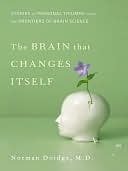The implant replaces the cochlea, transforming speech sounds into bursts of electrical impulses, which it sends to the brain. Because Merzenich and his colleagues could not hope to match the complexity of a natural organ with three thousand hair cells, the question was, could the brain, which had evolved to decode complex signals coming from so many hair cells, decode impulses from a far simpler device? If it could, it would mean that the auditory cortex was plastic, capable of modifying itself and responding to artificial inputs.
Welcome back. Just a moment while we sign you in to your Goodreads account.


